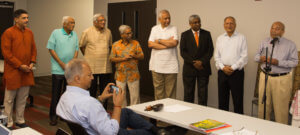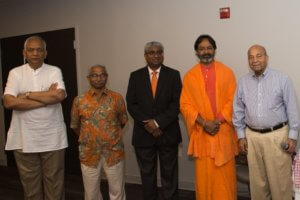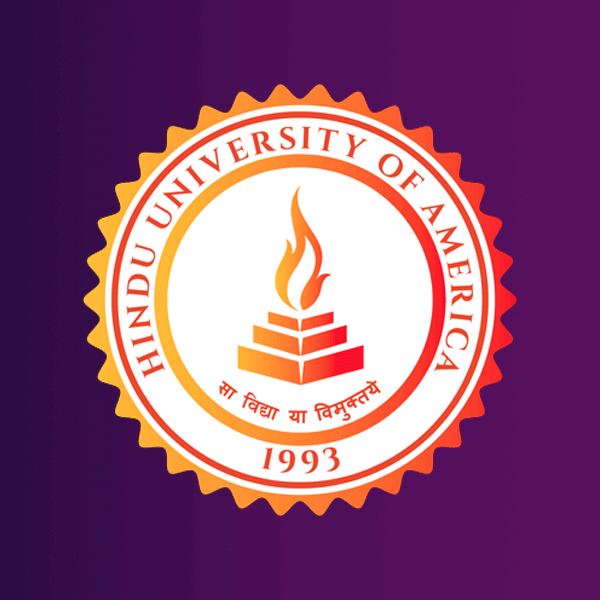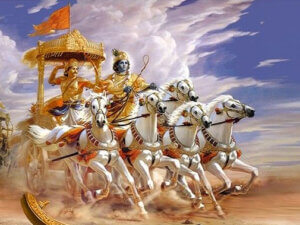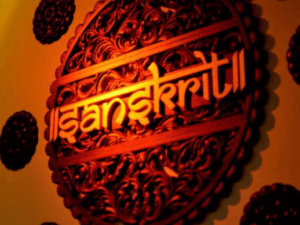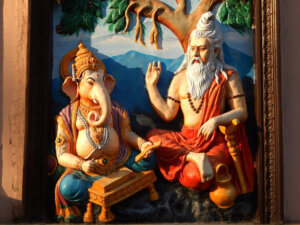Description
Doctor of Hindu Studies
Program Code:
DHS
Course Codes:
5000-9000
Credit Hours:
60 Semester Credit Hours
Duration:
5 years (full time)

Program Description
The Doctoral Program in Hindu Studies builds upon a solid foundation in Hinduism, advancing students into the realm of contemporary application and practice. When a student articulates the relevance of Hindu thought and practice to the specific challenges faced by the Hindu community and by contemporary humanity and is empowered to create innovative approaches centered on Hindu thought to address them, this constitutes mastery.
This enables students to move beyond the conceptual limitations of Orientalist and Indological scholarship which frames Hinduism as a relic of the past, and engage creatively with our shared, globally integrated future with confidence and clarity. Students must take 20 courses across five areas: Research Methods, Core Hindu Studies, Intersectional Studies, Specialization, and Doctoral Studies. Please see Structure of Program for a detailed description of the distribution of courses.
Program Learning Outcomes
Through the Doctoral Program in Hindu Studies, students will be able to:
- Research, articulate and address critical issues faced by the Hindu community.
- Develop models of stewardship of Hinduism and Hindu institutions.
- Analyze the impacts of Western interventions on Hindu society.
- Create effective approaches towards advancing epistemic justice.
- Propose interdisciplinary approaches towards resolving challenges facing humanity.
Who is this Program for?
The Professional Doctorate in Hindu Studies program is designed for those interested in applying Hindu Studies to an ethical, decolonial research agenda in examining real-world challenges and possibilities that impact communities and the planet.
While the program produces qualified researchers and professors, graduates may also go on to take up non-university roles, such as innovators, field builders, community leaders, educators, artists, policy makers, and therapists.
How long will this program take?
A full-time course load is considered 3 courses per semester. At this rate, a student can complete the required coursework (not including doctoral study advisement) for the Doctoral degree in 3 years. Part-time study is considered 1-2 courses every semester. At this rate, a student can complete the required coursework (not including doctoral study advisement) for the Doctoral degree in 5-9 years.
The time dedicated to research, analysis, writing, and defense of the Doctoral Study is in addition to this and will vary by student. If possible, full-time study is strongly recommended for at least some of the program as this supports the most effective learning experience.
Prerequisite
A Master’s Degree in Hindu Studies. Those with Masters Degrees in an adjacent discipline may be eligible for the program but may be require to complete surplus coursework beyond the stated requirements. Those with Masters Degrees in a discipline completely unrelated to Hindu Studies will be required to complete the Master’s Degree in Hindu Studies prior to being eligible to apply for the Doctoral Program.
Structure of the Program
The DHS program consists of a total of 60 credit hours of coursework.
Research Methods (3 Courses)
- HSF7000 – Research and Writing
- HSF7001 – Methods in the Study of Religion
- HSF7002 – Introduction to Research Methods
- HSF7003 – Ethnographic Field Research
- HSF7004 – Indigenous Research Methodologies
- HSF7005 – Methods of Analysis in Critical Intelligence
Core Hindu Studies (Any 4 courses from any category)
- Hindu Studies Foundations
- HSF7100 – Dharmasastra
- HSF8000 – The Brahmasutras
- CPS7500 – Philosophy of Shri Aurobindo
- Any approved course from the MA Program
- Sanskrit Studies
- SAN5101 – Vedic Science Foundations
- SAN6101 – Nyaya – Vaiseshika (Basic)
- SAN6105 – Applied Vedic Science – Yoga (Basic)
- SAN7101 – Nyaya – Vaiseshika (Advanced)
- SAN7105 – Applied Vedic Science – Ayurveda (Basic)
- SAN7106 – Mimasa (Basic)
- SAN7107 – Applied Vedic Science – Jyotisha (Basic)
- SAN8105 – Applied Vedic Science – Yoga (Advanced)
- SAN8106 – Mimasa (Advanced)
- SAN8107 – Applied Vedic Science – Jyotisha (Advanced)
- SAN8108 – Applied Vedic Science – Ayurveda (Advanced)
- SAN8109 – Applied Vedic Science – Vedanta (Basic)
- SAN8110 – Applied Vedic Science – Vedanta (Advanced)
- Texts and Traditions
- Yoga Studies
- HSF6003 – Yoga Darshana
- HSF6004 – Sankhya Darshana
- HSF6005 – The Yoga Sutras of Patanjali
Intersectional Studies (4 Courses)
- Postcolonial Studies
- PHS6302-Decolonizing the Hindu Condition
- PHS6303-James Mill and the Rise of the Liberal Left in Britain
- PHS7300 – Postcolonial Theory
- PHS7301 – Anticolonialism and Postcolonialism
- PHS7302 – Sociological Consequences of British Rule on India
- PHS7303 – Unpacking Caste and Hierarchy in India
- PHS7304 – Orientalism and Hinduism
- PHS7305 – Contesting Neo-Hinduism
- PHS8300 – Critical Issues in Hindu Studies
- PHS8301 – Philosophical Foundations of Orientalism
- PHS8302 – Philosophy of Science and Hinduism
- History and Method
- HAM6403 – Readings in Modern Hinduism
- HAM6404 – The Bhagavad Gita and the West
- HAM6405 – Race and Hindu Reform
- HAM7400 – History of German Indology
- HAM7401 – Aryanism and Indology
- HAM7402 – Philosophy of Race
- HAM7405 – Readings in Western Philosophy
- HAM8400 – Philosophy of History
- HAM8401 – Mahabharata Textual Criticism
- HAM8402 – Historicism and the Humanities
- Conflict and Peace Studies
- CPS7501 – Introduction to Conflict and Peace Studies
- CPS7503 – Gandhian Philosophy
- CPS7506 – Human Rights – A Vedanta Perspective
- CPS7507 – International Politics – A Vedanta Perspective
- Independent Studies
- ISC8001 and ISC8002 – Independent Study Course – Supervised by the Student’s Graduate Advisor
Specialization (6 Courses)
- Any approved course offered within HUA in the Graduate Curriculum
- Any approved course offered by an approved Institution outside HUA in an area of Student Interest
- ISC8003 and ISC8004 – Independent Study Course – Supervised by the Student’s Graduate Advisor
Doctoral Study Courses (3 Courses)
- DHS9000 – Doctoral Study Seminar
- DHS9001 – Doctoral Study Advisement I
- DHS9002 – Doctoral Study Advisement II
| Credits | Courses | |
|---|---|---|
| Research Methods | 9 | 3 |
| Core Hindu Studies | 12 | 4 |
| Intersectional Studies | 12 | 4 |
| Specialization | 18 | 6 |
| Doctoral Study Coursework | 9 | 3 |
| Total | 60 | 20 |
Courses in this Program
Research Methods (3 Courses)
- HSF7000 – Research and Writing
- HSF7001 – Methods in the Study of Religion
- HSF7002 – Introduction to Research Methods
- HSF7003 – Ethnographic Field Research (new)
- HSF7004 – Indigenous Research Methodologies (new)
- HSF7005 – Methods of Analysis in Critical Intelligence (new)
Core Hindu Studies (Any 4 courses from any category)
- Hindu Studies Foundations
- HSF7100 – History of the Dharma Shastras (existing and renumbered)
- HSF8000 – The Brahmasutras (existing and renumbered)
- CPS7500 – Philosophy of Shri Aurobindo (Existing – Renumbered)
- Any approved course from the MA Program (not already included in the MAH Program)
Sanskrit Studies
- Sanskrit Studies
- SAN5101 – Vedic Science Foundations
- SAN6101 – Nyaya – Vaiseshika (Basic)
- SAN6105 – Applied Vedic Science – Yoga (Basic)
- SAN7101 – Nyaya – Vaiseshika (Advanced)
- SAN7105 – Applied Vedic Science – Ayurveda (Basic)
- SAN7106 – Mimasa (Basic)
- SAN7107 – Applied Vedic Science – Jyotisha (Basic)
- SAN8105 – Applied Vedic Science – Yoga (Advanced)
- SAN8106 – Mimasa (Advanced)
- SAN8107 – Applied Vedic Science – Jyotisha (Advanced)
- SAN8108 – Applied Vedic Science – Ayurveda (Advanced)
- SAN8109 – Applied Vedic Science – Vedanta (Basic)
- SAN8110 – Applied Vedic Science – Vedanta (Advanced)
- Texts and Traditions
- TAT7201 – Mahabharata I – The Beginning and End (Existing – Renamed)
- TAT7202 – Mahabharata II – Dicing and Exile (Existing – Renamed)
- TAT7203 – Mahabharata III – The War Books (Existing – Renamed)
- TAT7204 – Mahabharata IV – Dharma and Darshana (Existing – Renamed)
- TAT7301 – Bhagavata Purana (New)
- TAT7302 – History of the Dharma Shastras (Existing – Renamed)
- Yoga Studies
- Any approved course from the MA Program not already included in the MAH Program
- HSF6003 – Yoga Darshana (New Course – Number has been reused)
- HSF6004 – Sankhya Darshana (New Course – Number has been reused)
- HSF6005 – The Yoga Sutras of Patanjali (Existing)
Intersectional Studies (4 Courses)
- Postcolonial Studies
- PHS6302-Decolonizing the Hindu Condition
- PHS6303-James Mill and the Rise of the Liberal Left in Britain
- PHS7300 – Postcolonial Theory (Renumbered)
- PHS7301 – Anticolonialism and Postcolonialism (Renumbered)
- PHS7302 – Sociological Consequences of British Rule on India (New course)
- PHS7303 – Unpacking Caste and Hierarchy in India (New course)
- PHS7304 – Orientalism and Hinduism (Renumbered)
- PHS7305 – Contesting Neo-Hinduism (Renumbered)
- PHS8300 – Critical Issues in Hindu Studies (Redesigned and Renumbered)
- PHS8301 – Philosophical Foundations of Orientalism
- PHS8302 – Philosophy of Science and Hinduism
- History and Method
- HAM6403 – Readings in Modern Hinduism (The Course title has been changed)
- HAM6404 – The Bhagavad Gita and the West
- HAM6405 – Race and Hindu Reform (Existing Course – Retained as is)
- HAM7400 – History of German Indology (New course)
- HAM7401 – Aryanism and Indology (Existing Course – Renumbered and Retained as is)
- HAM7402 – Philosophy of Race (New course)
- HAM7405 – Readings in Western Philosophy (New Course)
- HAM8400 – Philosophy of History (Existing renumbered)
- HAM8401 – Mahabharata Textual Criticism (New Course – reuses existing number)
- HAM8402 – Historicism and the Humanities (New Course – reuses existing number)
- Conflict and Peace Studies
- CPS7501 – Introduction to Conflict and Peace Studies (renumbered)
- CPS7503 – Gandhian Philosophy (renumbered)
- CPS7506 – Human Rights – A Vedanta Perspective (renumbered and renamed)
- CPS7507 – International Politics – A Vedanta Perspective (renumbered & renamed)
- Independent Studies
- ISC8001 and ISC8002 – Independent Study Course – Supervised by the Student’s Graduate Advisor (Maximum: 6 Credits)
Specialization (6 Courses)
- Colonialism / Postcolonialism
- Any approved course offered within HUA in the Graduate Curriculum
- Any approved course offered by an approved Institution outside HUA in an area of Student Interest
- ISC8003 and ISC8004 – Independent Study Course – Supervised by the Student’s Graduate Advisor (Maximum: 6 Credits)
- Doctoral Study Courses (3 Courses)
- DHS9000 – Doctoral Study Seminar
- DHS9001 – Doctoral Study Advisement I
- DHS9002 – Doctoral Study Advisement II
Doctoral Study
The professional doctorate will culminate in a Doctoral Study, an original scholarly paper that examines a real-world problem that relates to a specific applied area of Hindu Studies and offers a practical solution. The goal of the Doctoral Study is to demonstrate students’ command of the programs’ learning outcomes through the design, execution, and presentation of original research. The program will prepare students for the Doctoral Study through coursework in research methods, writing, and a doctoral study seminar. The phases of preparation and assessment for the Doctoral Study are as follows:
- Qualifying Exam (Written): At the end of the first year (for full time students) or the equivalent coursework (for part time students), students will complete a take-home qualifying exam. Students must receive a passing score on this exam in order to qualify for further study in the program. Students will receive detailed instructions and preparation for the exam from their Advisors.
- Doctoral Study Seminar: Development of doctoral study proposals for oral presentation. Students are required to take this seminar before proposing their doctoral study.
- Proposal (Oral): A formal proposal of the research question, design, and plan, including methodology. Students will present in front of their committee for 20 minutes, followed by a question-and-answer session.
- Research, Analysis, and Writing: Collecting data, analyzing, and writing up findings. Doctoral study papers are typically between 25,000-50,000 words. Students will receive guidance from their doctoral advisor and committee members during this period.
- Doctoral Defense (Oral): Students present their research findings to their committee. Successful defense is a requirement to graduate from the program and for granting of the degree.
Language Requirement
Doctoral students may complete their language requirement in one of two ways:
- Successfully complete HUA’s Certificate Program in Sanskrit Proficiency or an equivalent Certificate Program offered by HUA.
- Successfully complete of at least four courses that actively engage the department’s Sanskrit Glossary, followed by passing an in-house exam (with at least a C grade)
Students must complete the language requirement prior to their Doctoral Defense. Students who have advanced degrees in Sanskrit or show that they have passed an exam of equivalent or higher level (e.g., the Sanskrit Proficiency Test (SPT)), can apply for exemption from this exam. For students whose particular doctoral work requires a higher skill level in Sanskrit or any other language, the program recommends that they study and demonstrate the appropriate level of fluency; this will be discussed and determined with their advisors, with guidance and support at a program level.
Doctor of Hindu Studies
Program Context:
In the Doctoral Program in Hindu Studies, as students immerse themselves in critical inquiry, they will be able to evaluate the truth claims of the knowledge systems based in Hindu thought, rationally and systematically, in the light of contemporary advances in science, technology, the humanities and social sciences and other domains of knowledge. They will discover for themselves the complexity, validity, relevance, and contemporary value of Hindu thought. They will begin to reflect on the human condition, humanity’s history, and its future from the standpoint of Hindu cosmology.
They will critically examine the received knowledge on Hindu thought, culture and civilization, question established narratives with careful observation and evidence, in an atmosphere of academic excellence and freedom. They will explore the framework of ethics embodied in the idea of Dharma and its intersection with current trends in thought in one or more domains of philosophy, theology, religion, sciences, and the humanities. They will carefully interrogate the ideas of tradition, modernity, progress, evolution, spirituality, and self-discovery.
They will be able to articulate the Hindu worldview and cosmology with clarity and confidence, in written, oral and other media, and compare, contrast and critique different paradigms, methods and worldviews. They will begin to think from a Hindu context and promote innovative applications of Hindu thought towards addressing seemingly intractable contemporary challenges facing humanity, in a language and metaphor that is at once, timeless and transcendental, and contemporary and progressive.
The realms of Dharma and Moksha, Jnana and Yoga are the unique dimensions of Hindu thought. These dimensions take us beyond the domain of material success, wealth, status, influence, and power in the temporal world. They take us into a deeper dimension of human possibility i.e., the spiritual or the Adhyatmika realm. In each of us lies dormant a need and a desire for deeper engagement with the world, to converse and communicate, (Samvada), to contribute, to make a difference and be of service in a profound and meaningful way.
In each of us lies as yet unfulfilled the potential for leadership and global impact, sometimes even as yet unimagined. In every one of us without exception there lies the possibility of going within, exploring the realms of deeper levels of consciousness, and transforming our connection and relationship with the cosmos itself. Hindu thought carries within it the seeds of a greater possibility, of a deeper fulfillment and connection with the cosmos, a more profound self-expression, contribution, and service to humanity. The Doctoral Program in Hindu Studies is a quest, at once both intellectual and deeply spiritual, and a journey of both profound personal and social transformation.
X
Doctor of Hindu Studies
The tuition fee per credit hour for Graduate School courses is $ 500. The total cost of the DHS Program with 60 semester credit hours is $ 30,000. However, students have the option of signing up for annual payment plans that will reduce the cost.
The following payment plans are available:
- Pay in Full: $ 24,000 one-time payment. Saving of $6,000.
- 2-Year Payment Plan: $ 12,500 per year, total of $ 25,000. Saving of $ 5000.
- 3-Year Payment Plan: $ 9,000 per year, total of $ 27,000. Saving of $ 3000.
- 4-Year Payment Plan: $ 7,000 per year, total of $ 28,000. Saving of $ 2000.
- 5-Year Payment Plan: $ 5,800 per year, total of $ 29,000. Saving of $ 1000.
- Pay-as-you-go: $ 1,500 per Course, total of $ 30,000. Full Price.
- Pay-per-month for 6 Years / 72 months: $ 450 per month, total of $ 32,400.
There is also a one-time administration fee of $100 to be paid initially at the time of enrollment in the program.
From: $450.00 / month for 72 months and a $100.00 sign-up fee
Before you choose a payment plan, and get enrolled in the Doctor of Hindu Studies program, please make sure that you have completed the following steps.
- Applied for the Program.
- Received a letter of acceptance from the admissions office.
- Reviewed the enrollment agreement form.
- Determined your payment plan.
After all of the above steps have been completed, please choose a payment plan below and pay your fees.
X
Tuition and Payment
The tuition fee per credit hour for Graduate School courses is $ 500. The total cost of the DHS Program with 60 semester credit hours is $ 30,000. However, students have the option of signing up for annual payment plans that will reduce the cost.
The following payment plans are available:
- Pay in Full: $ 24,000 one-time payment. Saving of $6,000.
- 2-Year Payment Plan: $ 12,500 per year, total of $ 25,000. Saving of $ 5000.
- 3-Year Payment Plan: $ 9,000 per year, total of $ 27,000. Saving of $ 3000.
- 4-Year Payment Plan: $ 7,000 per year, total of $ 28,000. Saving of $ 2000.
- 5-Year Payment Plan: $ 5,800 per year, total of $ 29,000. Saving of $ 1000.
- Pay-as-you-go: $ 1,500 per Course, total of $ 30,000. Full Price.
- Pay-per-month for 6 Years / 72 months: $ 450 per month, total of $ 32,400.
There is also a one-time administration fee of $100 to be paid initially at the time of enrollment in the program.







